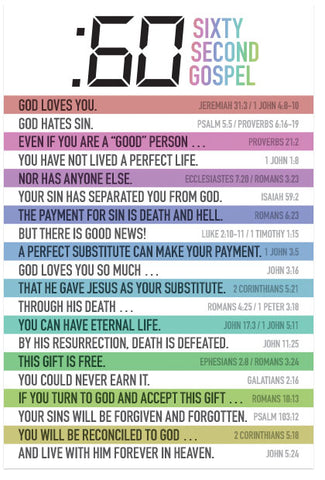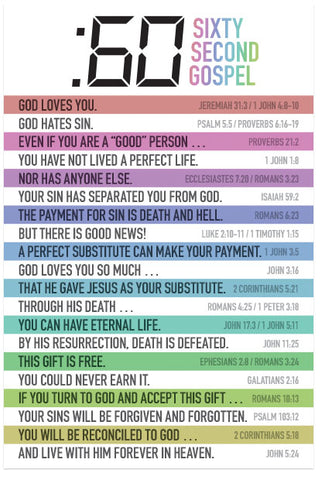A Layman's Guide to Christ's Work on the Cross
Special-Order Folded Tract
 NOTE: This item is custom-printed to order (click for more details).
NOTE: This item is custom-printed to order (click for more details).
This tract is from our print-on-demand library, and is not kept in stock. Select the options below, and we will custom-print a batch just for you. Because this item is custom-printed, you can add your custom imprint to the back page at no extra cost.
- Estimated shipping date: Thursday, March 26 (Click for more details)
- SKU:
- Discounts: Discount coupons do not apply to this item
- Format: Folded Tract
- Size: 3.5 inches x 5.5 inches
- Pages: 8
- Imprinting: Available with 5 lines of custom text
- Version: NLT
- Returns: Because this item is custom-printed to order, it cannot be returned.
Show all item details
The full text of this tract is shown below in the NLT version. (Do you want to print this tract in a different version than the one listed? Contact us and let us know what you're looking for—we may be able to create the alternate version for you at no charge.)
My car mechanic is a great guy. I appreciate him because he doesn’t just say what maintenance needs to be done on my car, but explains why it’s important and what will happen if it’s not fixed. But as he’s explaining the situation to me I usually have to interrupt him, “Okay, give it to me in a simple way” or “Talk to me like I don’t know anything about cars.” He knows so much about cars and how they work he sometimes forgets he can’t use jargon or technical language with me.
Pastors and churches can be guilty of this too. We’ve talked about “Christ’s death on the cross” so many times that we forget we need to explain what Christ did in an elementary way.
DEFINITION OF ATONEMENT
The doctrine of atonement is important because it explains why Jesus had to die and what his death accomplished. The Unger Bible Dictionary defines atonement as “the covering over of sin, the reconciliation of God and man, accomplished by the Lord Jesus Christ.”1 Atonement is from a Middle English phrase “at-one-ment” which describes the harmony we enjoy with God because of what Christ did on the Cross.
It’s directly related to the Jewish “Yom Kippur” which was the Day of Atonement when the high priest offered a sacrifice of atonement for the sins of Israel. There are four parts of this essential Christian doctrine.
SUBSTITUTION
The apostle Paul writes about substitution in Romans,
“When we were utterly helpless, Christ came at just the right time and died for us sinners. Now, most people would not be willing to die for an upright person, though someone might perhaps be willing to die for a person who is especially good. But God showed his great love for us by sending Christ to die for us while we were still sinners” (Romans 5:6-8, emphasis added).
We were lost, evil, and sinful, yet Christ came “to die for us while we were still sinners.” The phrase “to die for us” is the New Living Translation of the Greek word, ὑπέρ (huper), which often is translated “in behalf of.” A more literal way to translate “by sending Christ to die for us” of Romans 5:8 would be “by sending Christ to die on behalf of us” or “by sending Christ to die in behalf of us.” The preposition ὑπέρ (huper) is used to indicate that an activity or event is in some entity’s interest and is often translated as “for, in behalf of, for the sake of someone/something.” This was Paul’s way to describe how Christ died in our place and took the sinners’ just punishment.
REDEMPTION
Redemption is described in Matthew’s Gospel when Jesus was talking to his disciples about serving others and said,
“For even the Son of Man came not to be served but to serve others and to give his life as a ransom for many” (Matthew 20:28).
“Ransom” in this verse is translated from the Greek word λύτρον (lutron) which literally means “price of release.” It’s only used one other time in the New Testament (in Mark 10:45). This word was commonly used in writings around Matthew’s time to describe the price that was paid to free a slave. In effect, Jesus Christ was saying “I am here to serve, my life will be given for you. I’ll pay the price for you, and you get to be freed because of the price I am going to pay for you.”
Christ paid the price to free sinners from the power, consequences, and condemnation of their sins. We have been “redeemed” by the death of Christ which freed us from sin, cleansed us, and made us God’s own holy people.
PROPITIATION
God’s holy wrath against our sin is satisfied through Christ’s death. Early in his description of who Jesus was and what he came to do, John told his readers,
“And anyone who believes in God’s Son has eternal life. Anyone who doesn’t obey the Son will never experience eternal life but remains under God’s angry judgment” (John 3:36).
John wrote his gospel about Jesus Christ so that people would “believe that Jesus is the Messiah” and “have life by the power of his name” (John 20:31). God was angered against humanity because of their sin and wickedness toward him, but it was through Christ’s death that God’s anger was appeased.
RECONCILIATION
While the sins of Adam and Eve separated us from God, the gift of God in his son Jesus Christ provided a way for us to come back into relationship with God. Paul writes about this in his second letter to the Corinthians,
“And all of this is a gift from God, who brought us back to himself through Christ. And God has given us this task of reconciling people to him. For God was in Christ, reconciling the world to himself, no longer counting people’s sins against them. And he gave us this wonderful message of reconciliation. So we are Christ’s ambassadors; God is making his appeal through us. We speak for Christ when we plead, ‘Come back to God!’ For God made Christ, who never sinned, to be the offering for our sin, so that we could be made right with God through Christ” (2 Corinthians 5:18-21).
This passage makes it clear that God brought us back to himself through Jesus Christ (v. 18), God was reconciling the world back to himself through Christ (v. 19), Christ helps people come back to God (v. 20), and it was solely because of Christ that we could be made right with God (v. 21). Christ’s death allows for forgiveness of man’s sin and restoration of our relationship with God in love.
NOW WHAT?
Growing up in church I always heard that “Christ died for your sins” (substitution) which was true and biblical. Yet Scripture is clear that Christ did much more: he paid the price to give us freedom (redemption), satisfied God’s holy wrath (propitiation), and made the way for us to be brought into God’s family (reconciliation).
How do we receive the benefit of these amazing provisions? The Bible says we must first recognize that without Christ, we are spiritually dead because of our sin (Ephesians 2:1). No amount of religious activity can erase our sin or restore our relationship with God. It is only through the work of Jesus Christ that we can have our sin forgiven and receive eternal life. And we receive the benefit of his work when we put our full trust (faith) in Jesus Christ.
“God saved you by his grace when you believed. And you can’t take credit for this; it is a gift from God.” Ephesians 2:8
1. The New Unger’s Bible Dictionary (Chicago, IL: Moody Press, 1988), 123.















